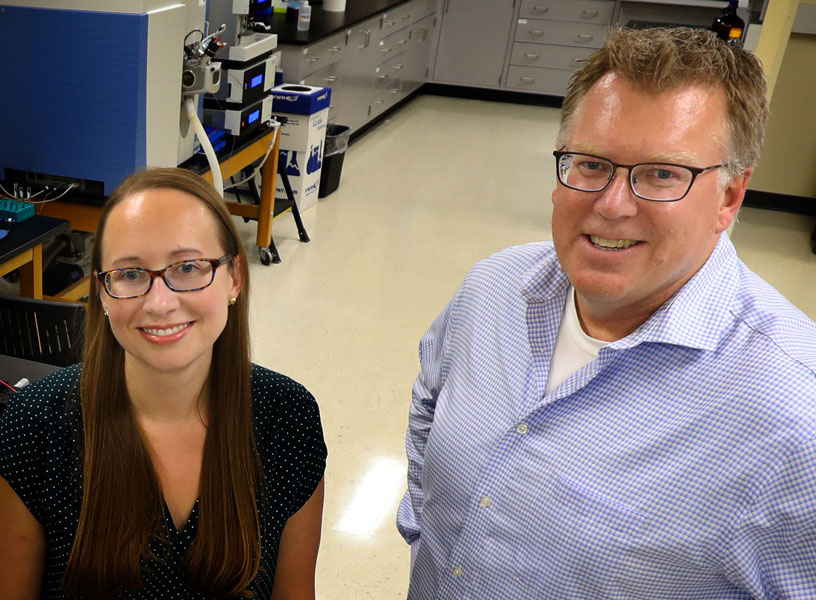Research Briefs

Significant Grant Bolsters DNA, Cancer Research
DNA replication and repair carries implications for cancer formation and other health challenges. Michael Trakselis, Ph.D., professor of chemistry and biochemistry, focuses his research at the intersection of replication and repair, studying how unique attributes of the process impact cancer formation.
Last summer, Trakselis received two significant National Science Foundation (NSF) grants totaling over $1.2 million to advance that research.
The first grant funds studies on understandings the mechanisms for physical and functional coupling of DNA unwinding and synthesis. DNA replication is a combination of several coordinated enzymatic processes resulting in a cellular symphony, responsible for the duplication of the genome. However, that process can become disconnected with transient starting, stalling, stopping and restarting events. More frequent enzymatic decoupling can leave the genome unprotected, leading to more DNA damage and increasing the probability for cancer-causing genomic mutations.
A second project partners Trakselis with Elyssia Gallagher, Ph.D., associate professor of chemistry and biochemistry, to utilize mass spectrometry techniques to understand complex protein-DNA interactions. This collaborative partnership expands the capabilities of both laboratories in a novel interdisciplinary project examining DNA binding protein stabilities and conformations by mass spectrometry.
“We love to live at the interface of different techniques, different fields, and combining this biochemistry with mass spectrometry is not something many people do,” Trakselis said. “To receive two significant research grants within two months is so humbling, and it’s exciting to think about the future progress we can make with the support from these grants.”
Perceived Discrimination, Real Stress in the Workplace
Kaylee Hackney, Ph.D., assistant professor of management in Baylor’s Hankamer School of Business, was excited when she discovered she was pregnant, but stress soon overshadowed her joy. She was a doctoral student at Florida State University and worried that her pregnancy would impact her working relationships with professors.
“I did not know if they would push me out of the program because they did not think I was serious anymore about doing a Ph.D.,” Hackney said. “It was not that anybody had done anything; it was that I had worked it up in my head so much.”
Pregnancy discrimination has been illegal in the United States since 1978, but Hackney said that has not stopped expectant mothers from perceiving workplace discrimination. These experiences lead to added stress, which has been proven to negatively impact the mother’s health. Hackney also contemplated the impact on the baby’s health.
Hackney, along with colleagues from Florida State, Florida Gulf Coast and Florida International Universities, looked at data associated with employed pregnant women, primarily in the third trimester, and utilized multiple survey waves to gauge perceived discrimination and stress for the mother, gather information on health outcomes for the mother and child, and examine the implications of perceived pregnancy discrimination and stress on the babies’ health.
The research team discovered that stress caused by perceived pregnancy discrimination negatively impacts the health of the mother and the baby. Their research results — Examining the Effects of Perceived Pregnancy Discrimination on Mother and Baby Health — were published in The Journal of Applied Psychology.
Hackney said communication between manager and employee is critical in these situations. Having a discussion before changes are made could prevent any stress or negative feelings for the mother-to-be.
“The big takeaway is that the workplace has a pretty far-reaching impact on pregnant employees,” Hackney said. “Pregnancy discrimination happens; just because it has been made illegal does not mean that we have done our job and can wash our hands of it. This study highlights the importance of providing or creating a supportive culture around family building.”
A Research Voice for Singers and Performers
Singers are often willing to take supplements that may improve their vocal range and quality, but little research has been done on their impact. An interdisciplinary group of Baylor researchers is working to change that.
“Singers are very protective of their health because our instruments are inside our bodies,” Kimberly Monzon, D.M.A., assistant professor of voice, said. “We’re training vocal athletes who are at risk for vocal injury in a similar way to an athlete in sports is at risk for injury. We need to build up the voice to prevent that.”
Monzon has conducted three studies to examine the impact of Omega-3, a popular supplement for singers, on the voice. LesLee Funderburk, Ph.D., assistant professor in nutrition sciences, Brittany Perrine, Ph.D., assistant professor of communication sciences and disorders, and Lauren Weber, lecturer of musical theater, joined Monzon in the research, which found that Omega-3, commonly known as “fish oil,” is linked to improved vocal quality. Participants who took Omega-3 were able to hit lower notes and experienced a benefit in fat mass loss. The project was sponsored by the University Research Committee.
“It’s exciting to expose fine arts students to hard science research,” Weber said. “As singers, we strive to make joyful noises unto the Lord. This research is invaluable to everyone who has a high vocal load.”

